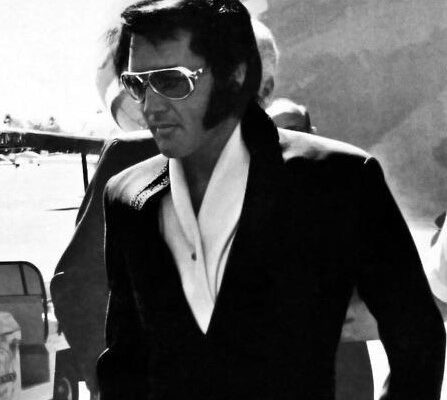
Elvis Presley and his group had a novel notion for amusement that definitely went against the grain of conventional entertainment. Imagine a bunch of individuals at a leased skating rink, all dressed in full Air Force uniform, complete with helmets, gloves, and protective goggles, participating in what can only be characterized as a chaotic show. They were there to light off $15,000 worth of pyrotechnics, not to skate.
The idea came straight from Elvis himself, who believed that any game worth playing should be as dangerous as possible. What followed was a full-blown fireworks battle, with everything from sky rockets to baby giants, firecrackers, and the unpredictable chaser fireworks that darted around until they exploded. The whole scene must’ve felt like something straight out of an action movie—a chaotic yet thrilling spectacle, where everything was high stakes.
The setting was made even more insane by the fact that some Memphis Mafia members were delighted to contribute money for this crazy trip. It was not surprising that everyone dressed in full protective gear given the unpredictability of the fireworks and the constant danger in the air. Despite the risk, there was an unquestionably exciting aspect to this careless, iconic kind of entertainment that Elvis had created—a window into the untamed and unexpected side of the King’s world.
According to them, the autopsy report on Elvis Presley won’t be made public until 2027, which is the 50th anniversary of his passing. Even that one information seems unsettling, as though the reality of his last days has been hidden away because it is too hard or unvarnished for the public to witness. The enigma surrounding a man who appeared unbeatable under stage lights but was incredibly frail when the curtains closed is only made more complex by this.
On tours of Graceland, guides always emphasize that Elvis never drank alcohol. He truly didn’t. To many, that sounded like proof of discipline, a kind of purity. Yet what no one wanted to admit was that while he avoided alcohol, he quietly fell into something far more dangerous — prescription pills. In the 1960s and 70s, no one thought of it as addiction. Doctors prescribed them freely: pills to sleep, pills to wake up, pills to numb anxiety, pills to keep performing.
For two decades, Elvis was the hardest-working man in music, carrying the weight of superstardom while trying to outrun his own exhaustion. The world only saw the sequined jumpsuits, the sold-out arenas, the dazzling smile. They did not see the lonely man behind the gates of Graceland, swallowing whatever it took just to keep moving forward.
And the sadness lies in that. Alcohol and controversy did not ruin Elvis Presley. which far quieter, which the public dismissed at the time, undid him. Despite being the biggest celebrity of his time, he departed the stage with a stillness that no amount of medication could break rather than a dieu. His tragedy ranks among the most tragic losses in music history when one considers how much more he may have contributed and how alone he must have felt.


